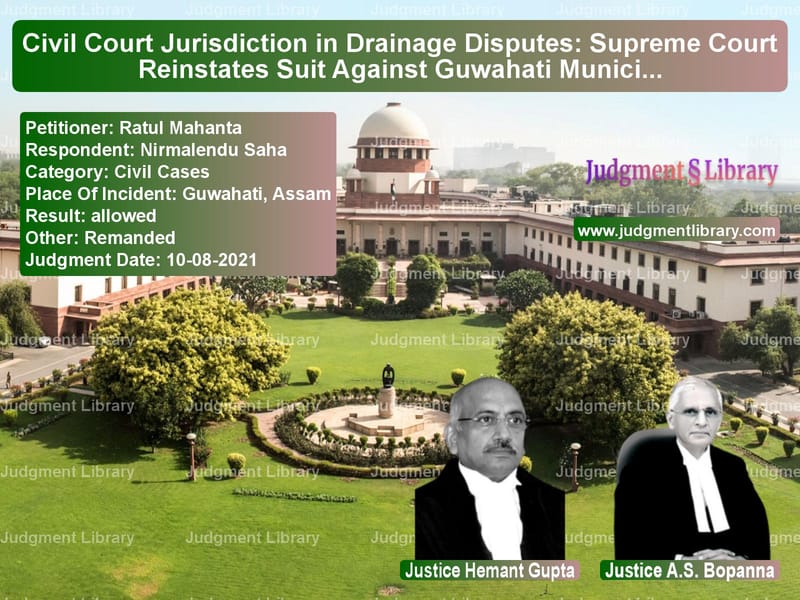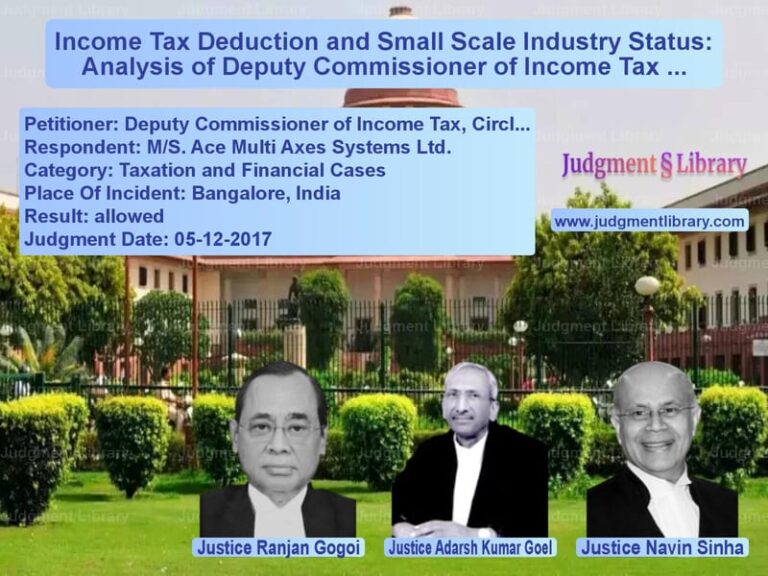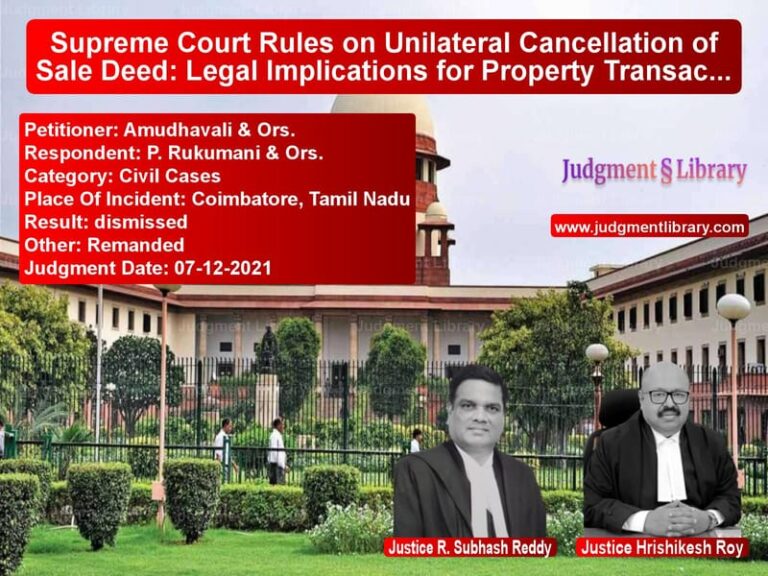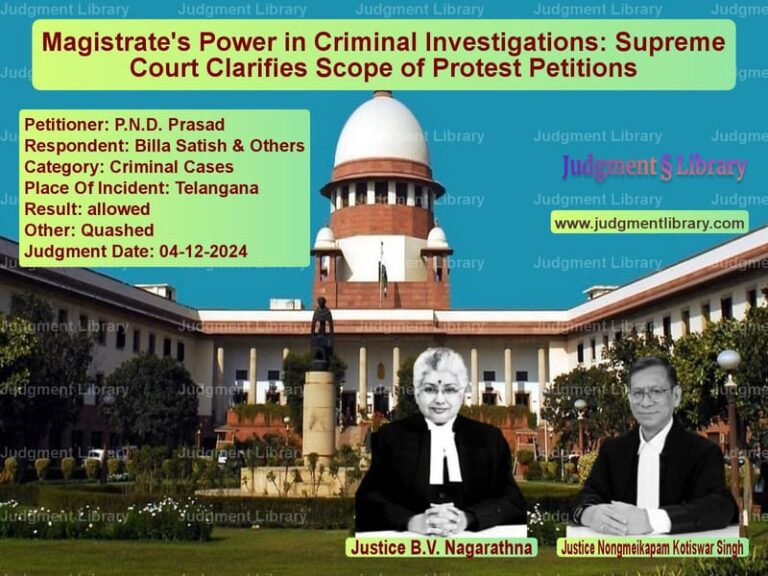Civil Court Jurisdiction in Drainage Disputes: Supreme Court Reinstates Suit Against Guwahati Municipal Corporation
The case of Ratul Mahanta vs. Nirmalendu Saha dealt with an important question: whether a civil suit seeking the protection of an existing drainage right can be entertained by a civil court when the Guwahati Municipal Corporation (GMC) Act provides alternative mechanisms. The Supreme Court ruled that the suit was maintainable, setting aside the Gauhati High Court’s decision that had dismissed the case under Order VII Rule 11(d) of the Civil Procedure Code (CPC).
Case Background
The appellant, Ratul Mahanta, had filed a civil suit (Title Suit No. 334 of 2011) before the Munsif Court in Kamrup, Guwahati, seeking a declaration that a public drain along the western boundary of his property should remain accessible for drainage. He also sought an injunction to prevent the defendant, Nirmalendu Saha, from obstructing the water flow in the drain leading to the Guwahati Municipal Corporation (GMC) drain.
The defendant contested the suit on both factual and legal grounds, arguing that the civil court lacked jurisdiction under the GMC Act. The Trial Court granted a temporary injunction, but the defendant appealed. The appellate court ruled that the issue of jurisdiction should be decided before any further proceedings. The High Court later ruled that the suit was barred under the GMC Act, leading to the rejection of the plaint.
The appellant challenged the High Court’s decision in the Supreme Court.
Arguments by the Appellant (Ratul Mahanta)
- The appellant argued that his suit was not barred by the GMC Act, as he was asserting a pre-existing right over the drain.
- “The relief sought does not involve the creation of a new drainage right but the protection of an existing one,” the appellant contended.
- The bar on civil court jurisdiction under Section 341 of the GMC Act applied only to specific disputes under Part VI of the Act, not to private property disputes.
- The High Court erred in applying Order VII Rule 11(d) of the CPC to reject the plaint without considering the specific nature of the dispute.
Arguments by the Respondent (Nirmalendu Saha)
- The respondent argued that the GMC Act provided an alternative mechanism for resolving drainage disputes, thereby ousting civil court jurisdiction.
- “Under Sections 246 to 248 of the GMC Act, the Commissioner has the authority to regulate drainage disputes, making civil court intervention unnecessary,” the respondent claimed.
- The appellant could have sought redress through the municipal authorities instead of approaching the civil court.
- The High Court was correct in applying Order VII Rule 11(d) to bar the suit.
Supreme Court’s Analysis
The Supreme Court examined two key issues:
1. Does the GMC Act bar civil suits in drainage disputes?
- The Court ruled that the GMC Act does not impose a general bar on civil suits concerning private property rights.
- “The bar under Section 341 applies only to disputes arising under Part VI of the GMC Act and does not extend to inter-party disputes over property rights,” the judgment stated.
2. Was the rejection of the plaint under Order VII Rule 11(d) justified?
- The Court held that the High Court erred in rejecting the suit at the threshold without considering the merits of the dispute.
- “Order VII Rule 11(d) applies only when a suit is clearly barred by law. In this case, the existence of an alternative remedy under the GMC Act does not automatically exclude civil court jurisdiction.”
- The plaintiff was asserting an existing right over the drain, not seeking the creation of a new one, making the case a civil matter.
Supreme Court’s Judgment
The Supreme Court ruled:
- “The judgment of the Gauhati High Court dated 06.06.2014 is set aside.”
- “The suit filed by the appellant is restored to the file of the Munsif Court in Kamrup, Guwahati.”
- “The parties shall appear before the Trial Court on 01.09.2021 for further proceedings.”
Conclusion
This judgment clarifies that the presence of a statutory mechanism does not automatically exclude civil court jurisdiction in property disputes. The ruling reinforces the principle that civil courts remain competent to adjudicate claims concerning pre-existing property rights.
Petitioner Name: Ratul Mahanta.Respondent Name: Nirmalendu Saha.Judgment By: Justice Hemant Gupta, Justice A.S. Bopanna.Place Of Incident: Guwahati, Assam.Judgment Date: 10-08-2021.
Don’t miss out on the full details! Download the complete judgment in PDF format below and gain valuable insights instantly!
Download Judgment: ratul-mahanta-vs-nirmalendu-saha-supreme-court-of-india-judgment-dated-10-08-2021.pdf
Directly Download Judgment: Directly download this Judgment
See all petitions in Property Disputes
See all petitions in Landlord-Tenant Disputes
See all petitions in Specific Performance
See all petitions in Judgment by Hemant Gupta
See all petitions in Judgment by A. S. Bopanna
See all petitions in allowed
See all petitions in Remanded
See all petitions in supreme court of India judgments August 2021
See all petitions in 2021 judgments
See all posts in Civil Cases Category
See all allowed petitions in Civil Cases Category
See all Dismissed petitions in Civil Cases Category
See all partially allowed petitions in Civil Cases Category







